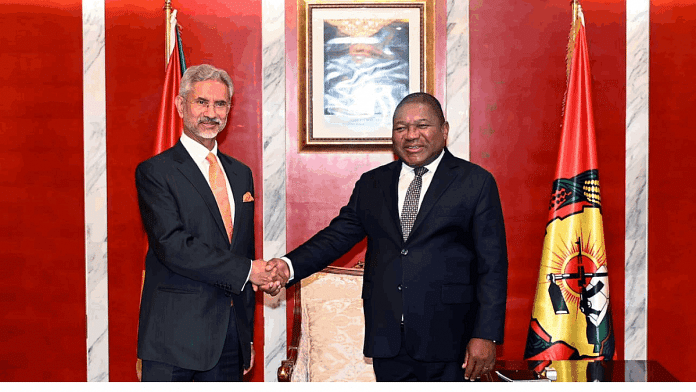New Delhi: It’s an unorthodox experience to watch a foreign minister standing on a moving train in a foreign country, holding a bus handle and conducting a press conference. More so, when that train was manufactured in his own country.
From 13-15 April, External Affairs Minister S. Jaishankar became the first Indian foreign minister to visit Mozambique, during which he rode a ‘Made in India’ train alongside the country’s transport minister. It was reminiscent of August 2010 when then Japanese Foreign Minister Katsuya Okada rode the Delhi Metro – which was built on loans and technical assistance from Japan’s International Cooperation Agency (JICA).
Three days before Jaishankar’s train ride in Mozambique, he was in Uganda where he inaugurated the first-ever overseas campus of India’s National Forensic Science University (NFSU) that sprawls over 130 acres.
The foreign minister’s six-day visit to the two African states came at a time when India is looking to expand global engagement as a whole.
Analysts ThePrint spoke to say while India and Africa have always had a history to fall back on, be it a shared colonial past or the Non-Aligned Movement, New Delhi’s foreign policy towards the continent has taken a different shape in recent years with maritime security and defence as focus areas of cooperation.
A “refresher” to the relationship was India’s ‘Vaccine Maitri’ programme – under which it claimed to have given 2.5 crore doses of domestically made shots to 41 African countries – that seemed to have “boded very well” to many in the continent, they added. (India notably pledged more vaccines to Africa after China announced 100 crore doses for the continent.)
EAM Jaishankar’s visit appears to have “built upon that goodwill”, former ambassador Rajiv Bhatia, who has served in South Africa and Kenya, told ThePrint.
Defence, energy ties & maritime security
During his visit to Uganda, Jaishankar inaugurated several projects, including a solar-powered piped drinking water supply system funded by India Exim Bank. However, a key event was the inauguration of the first overseas NSFU campus in Jinja.
While it may have appeared to be a form of India’s education diplomacy, Uganda’s defence minister also graced the occasion. The institute would help enhance the “investigative capacities” of his country’s law enforcement, he said. Jaishankar too remarked that the event marked “robust defence ties” between India and Uganda.
In Mozambique, he inaugurated the Buzi Bridge that is part of a mega-road project funded by a $149 million line of credit from the Indian government. But there could have been a larger strategic move at play.
According to Bhatia, India is looking at countries such as Mozambique as it diversifies its energy imports, having already invested quite significantly in the African country’s gas fields.
India is currently one of top investors in the African continent, mostly towards countries that fall on the east, such as Mauritius, Mozambique, Sudan and others, according to experts.
New Delhi also has maritime security interests with these countries as it shares the Indian Ocean with them.
Analysts agreed that Jaishankar’s visit will likely set the stage for the next India-Africa Forum Summit (IAFS). Some said this kind of outreach to Africa may also bode well for India in the UN.
“As India seeks to garner support for a permanent seat on the UNSC, I think it will also start looking at the African continent as 54 votes at the UN,” Abhishek Mishra, Associate Fellow with Delhi-based Observer Research Foundation (ORF), whose research focuses on Indian engagement in Africa, told ThePrint.
‘More to be done’
In 2018, PM Modi gave an impassioned speech at the Uganda Parliament where he said Africa will be “at the top” of India’s priorities.
While India has signed a number of MoUs in the fields of education, science, infrastructure and others with various African countries, several high-level officials such as then Vice President M Venkaiah Naidu embarked on Africa tours too.
However, some analysts say there’s more to be done.
Dr Neha Sinha, Senior Assistant Professor at Amity University and former researcher on Africa affairs at Indian Council of World Affairs (ICWA), says air connectivity and the banking sector are areas where India and African states can cooperate better.
“There should be more direct flights between Indian cities and those in Mozambique and Uganda. Very often, you have to fly to Addis Ababa in Ethiopia and then travel to these other African states. It would also be helpful if we can set up more Indian banks in Mozambique to streamline businesses there,” she said.
(Edited by Smriti Sinha)
Also read: Jury still out on Jaishankar-Bilawal meet on SCO sidelines amid shadow of Poonch attack



